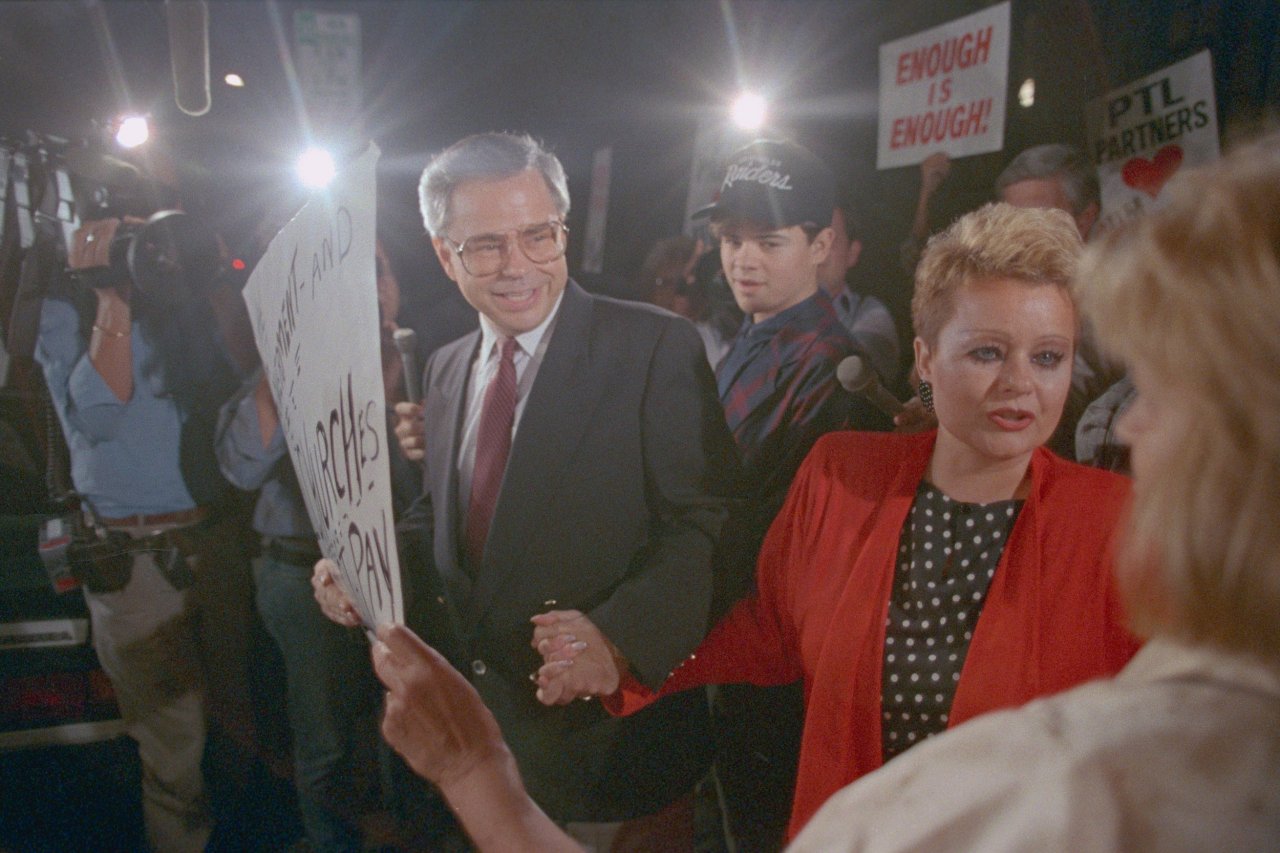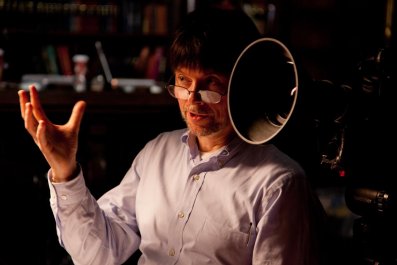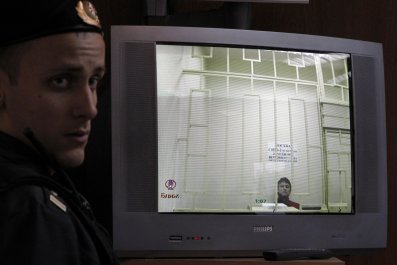Updated | A shameful confession as preamble: I have enjoyed a lifelong addiction to the far end of the cable TV spectrum, where silver-tongued hucksters both sacred and profane dispense all manner of feel-good goods—from juicers to Jesus—from dawn until dusk and well into the wee hours.
Credit nature and nurture both for my obsession with media-delivered bunco schemes. My late father, Rubin, was one of the TV-radio voice-over kings of the Midwest, and I was often in the control room while he waxed ecstatic over drag strips and dill pickles and the like. He was even the hard-sell voice of the Veg-o-Matic—ur-pitchman Sam Popeil's slicing-and-dicing eighth wonder of the widget world. ("The only tears you'll cry are tears of joy," he said over a shot of a bloodshot housewife chopping onions the old way.)
It was also in my teenage years that I discovered the earthy virtues and hard-boiled humor of Detroit's African-American radio priesthood, whose guttural and metric testifying was the perfect complement to the Howlin' Wolf and Muddy Waters records I'd fallen for. To me, there was little difference between a bluesman and a preacher: Both were in the business of inspiring their working-class and weary brethren. Listening to "Reverend John" drop horse-racing metaphors in the middle of his biblical teachings was nearly seductive enough to convert a nonpracticing Jew from the outer suburbs. Handicapping nags I could relate to—moral suasion, not so much.
But what mystifies me to this day is how an only nominally charismatic salesman or holy man is able to persuade otherwise reasonable people to part with their will and their wallets with nary a whimper. Does the oft-quoted line from P.T. Barnum about the prolific birthrate of fools really explain our susceptibility to schemes and scams and eschatological hoodoo? Perhaps we are not the "political animal" that Aristotle dubbed us, but the credulous one. We are built to believe.
And don't think there aren't plenty of sharks out there profiting by our need to attach ourselves to something bigger than our own little lives. One of the more heartless spiritual hustles of the last 75 years is the "prosperity gospel"—promising miraculous returns to those faithful enough to "plant a seed of faith."
"You need to give to get" is the implicit and incessant message—the Big Guy looks askance at those too cheap to Visa-swipe their faith, but he does train a beneficent eagle eye on any garden-variety sinner who coughs up a hundred a month to an overfed, Bible-clutching multimillionaire like Benny Hinn, Mike Murdock, Creflo Dollar or Peter Popoff, my personal "favorite." Popoff is as close as real life can get to a Saturday Night Live skit: His bathetic pleading and unctuousness is a hoot—especially if you go in for that old "throw away those crutches!" routine. Yes—just a few measly drops of his "miracle spring water" will cure what ails your body, soul and bankbook alike.
But Popoff and his ilk are hardly breaking news—magician-healers like Oral Roberts have been around since the dawn of religion. But what if a particularly gifted grifter could merge televangelism and retail infomercials into a hybrid genre, wedding a for-profit sales platform with a cosmic plea for faith-based living? Enter infamous man-of-the-tattered-cloth Jim Bakker, a convicted felon who is back on television (via DirecTV, Roku, Apple TV) to warn his minions that the dreaded end days are fast approaching, and that they'd better start stocking up on dehydrated survival food ASAP.
Yes, the good Pastor Jim will trade you a seven-year supply of pasta, oatmeal, whey milk and black bean burger mix in exchange for a "love gift" to his "ministry" of $3,500. On top of that, he'll swap you a solar-powered, "fuel-less" generator ($1,784) to heat the water to cook the uni porridge, as well as various mid-tech water bottles and hand-cranked ham radios that are sure to come in handy when Satan and his sooty soldiers light out on their final scavenger hunt for unredeemed souls.
Here's how the new and improved Jim Bakker Show is formatted: Bakker and his second wife, Lori Beth (in whose name all of his assets are reportedly protected, given his unpaid $6 million debt to the IRS), have taken root in a rural suburb of Branson, Missouri, co-hosting an apocalyptic-themed "talk show" whose guests hold forth exclusively on those pesky, fast-approaching end times. Tsunamis, earthquakes, financial meltdowns, the Zika virus and ISIS—all are cited with a smattering of Revelation and rapture-rap, immediately followed by an ardent sales pitch for flashlights, foodstuffs and even real estate sales and rentals at Morningside (a 600-acre parcel in the Ozark foothills), where Bakker has teamed up with local developer Jerry Crawford to market a Christian-oriented residential enclave.
Sound familiar? Those of you who recall Bakker from his PTL (Praise the Lord) Club TV show may also remember how he fell afoul of the feds back in 1978: by overselling time-shares in debt-plagued Heritage USA—the biblically themed amusement park and resort—which landed Bakker behind bars for mail and wire fraud for the better part of five years. Fellow traveler Jerry Falwell damned him with faint praise, calling him "the greatest scab and cancer on the face of Christianity in 2,000 years of church history."
You may also recall the more lurid episodes in Bakker's life—like the $265,000 in hush money he paid then–church secretary Jessica Hahn to keep mum about their "consensual" sexual liaison (or rape, in her version). Bakker and then-wife Tammy Faye—she of the acres of eyeliner and foot-long lashes—were also conspicuous consumers of the first rank, wheeling about in matching Rolls-Royces and outfitting a $50,000 doghouse with air conditioning, all with the donated dollars of their faithful followers ($158 million, according to his fraud conviction).
These days, Bakker speaks openly of his inglorious past (while still denying his guilt), and how he immersed himself in the word of God while ensconced in a minimum-security lockup, which he credits for his miraculous "restoration" and highly unlikely comeback story. His recent benefactor and—by all appearances—business partner, Crawford, is said to have invited Bakker and his wife to broadcast from his Branson redoubt to thank Bakker for saving his once-troubled marriage.
A savvy marketing move, as it turns out: Now a goodly chunk of Bakker's endlessly looping show is devoted to promoting real estate rentals and sales at Morningside. Given its eerie similarity to the Heritage USA operation, one prays that Bakker's involvement is closely vetted by lawyers and tax accountants to make sure he doesn't again wind up doing crossword puzzles in an orange jumpsuit.
His newfangled hybrid of religion and retail—which one might fancifully dub a mutant strain of PTL and QVC—may call into question what percentage of Bakker's enterprise is tax-free (under section 501(c)(3) of the IRS code governing charitable organizations), and which is subject to federal tithing requirements. Although Bakker does occasionally tote and quote from the New Testament (which he also sells on his website, in various versions and color schemes), most of the broadcast is dedicated to hustling hard goods that can be actually bought for 50 cents on the dollar at competing survival-minded websites.
And according to a retired IRS investigator, customers/parishioners who "donate" funds in exchange for Bakker's giant buckets of "creamy potato soup" and the like can write off only the amount exceeding the fair market value of the goods received. Those hoping to deduct the entire $9,660 purchase of, say, the Time of Trouble Italiano Marinara Offer (that's seven years or 7,728 servings of pasta) should look again at the fine print. As for the taste? Well, you can watch a professional chef prepare and (attempt to) eat the stuff here.
Then again, if you bought such stuff for less, you wouldn't benefit from the daily parade of bug-eyed pessimists whom Bakker features on his show. One such guest, a rabbi named Jonathan Cahn, author of The Mystery of the Shemitah, regularly discusses end-time events, while hosting guided tours of Israel on the side. And of course, DVDs of these boondoggle/pilgrimages are for sale on the show! The Bakkers are front and center, alongside right-wing kook Joseph Farah of World Net Daily (Cahn's publisher). More recently, the couple are shown cavorting about St. Kitts and Nevis, where Bakker claims he's in talks with the prime minister about erecting a shortwave transmitter.
"We can't do it alone, people," Bakker repeatedly says in his plea for more money, citing the need for a hilltop chapel, a new grand piano or a home for pregnant teens. Thus, there's always a new product on the hustings to breathlessly hype, followed by nightmare-inducing tales of the coming terrible times. (Bakker loves to bring up the dreaded "electromagnetic pulses," which he promises will kill up to 95 percent of humanity, while destroying the grid and world financial system simultaneously.) Cream of potato soup, anyone?
All of the above might be far more amusing if the brunt of Bakker's credulous cohort wasn't composed of people of humble means. Over 60 percent of the 5 million perennial viewers of televangelists are elderly women—this according to Ole Anthony of the Trinity Foundation, which has been tracking such greed-driven televangelists for years. "It's toxic loneliness" that drives such people to watch such programming, Anthony tells Newsweek. "And then there are those in the desperation pool, as we call it. Their son has AIDS. They're dying of cancer, and they've tried everything else. So they send the money.
"It just amazes me that he could go back on the air after a judge said he could never do that kind of thing again," Anthony adds resignedly. "The guy definitely has seven lives."
Correction: An earlier version of this story incorrectly stated that Rabbi Cahn was based in Brooklyn. The text has also been amended to correct the suggestion that he had mis-predicted the end of the world; he has never put a date on future or specifically end-time events, and has consistently warned against such predictions and date-setting.





















